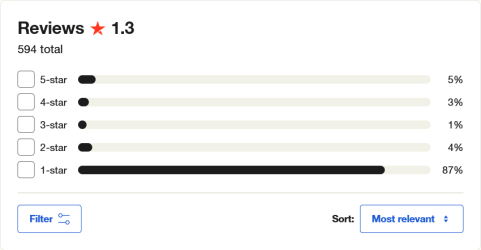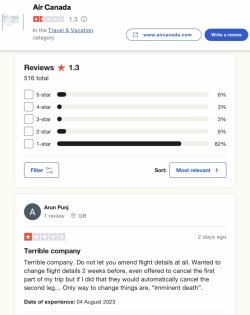Fair enough, but its the 'more price sensitive' travellers who benefit most when insurance is needed. I wouldn't push my 'third party insurance' analogy too far, but like insurance, EU261 type protection is always an imposition - until you need it.
I agree its an imposition until you need it, although all insurance is like that. Maybe a better way is to have a mandate that all traveler must have insurance, thus allowing us to see the cost more directly. I think that would be absurd, but it would remove the socialisation of the cost. That aside, I think it's naive to expect that airlines will change practices and behaviours to only mitigate costs by doing everything in their power to avoid delays. They are far more sophisticated and have the ability to measure these costs. They now have total look through of their cost function and can optimise around it.
I don't think VA1 went 'bankrupt' as a strategy to lower costs. I'd be more sympathetic to the argument about the relative competitive position of QF and VA over the past few years if it wasn't for the enormous profit QF generated (not all cash surplus of course).
What I think Qantas should have done differently is not to have a perennial war on unions (as much as I dislike unions!) - their workforce - and not outsource services to the lowest bidder; kept expertise and contingency in-house so they can react better and faster to problems; invested in decent IT; invested in other than the dreadful off-shore call centres; invested earlier in renewing the fleet. Many of these of course would apply before covid/covid recovery, but the company's customers unfortunately reaped what the management sewed over a number of years, which culminated with the company was making a huge profit. Diversion of some of that large cash-flow into improving the IT/call centres/baggage issues during 2021/22 would have helped a great deal.
Apologies if it implied that they went bankrupt to lower costs. The point that I was making was that bankruptcy gave VA a huge opportunity to reset their cost base, and much lower than QF's. They were able to discharge historic debts, cancel leases they didn't like, renegotiate others, and renegotiate labor from a much stronger strategic position. This in itself placed some competitive cost pressures on QF.
Yes, but if you look at the international competitors who are fully/part state owned (eg QR, SQ), their fares don't flat-out undercut Qantas' - for example, there was some numbers put up in another thread recently that showed QR was certainly not the cheapest option to Europe in J, IIRC. That's not to say it always happens, but its not as if the state-owned/subsidised carriers undercut Qantas to an unfair extent. The likes of QR and SQ compete successfully on service.
I agree that they have a terrible relationship with labor, and that even predates Joyce. Efforts to circumvent labor this go back a long time, for example, Jetconnect predated Joyce by 6 years. While it seems crude, there is simply no easy choice for QF. Labor in Australia is expensive compared to what competitors are paying.
I agree, competitors are not undercutting QF, but they are selling tickets at similar prices, generating similar revenues, while having a lower cost base. QF have limited means to compete since many costs are exogenous (e.g., fuel, aircraft, cost of capital, etc). Unfortunately, many of the things you highlight, from IT to reservations are really a function of labor costs. Competitors like EK and QR insource this by bringing cheap labor into the country, others like SQ also outsource some of these things (shocking, I know). SQ and QR do compete on service, but again, they can do this because labor conditions are different. And this doesn't even take into account EK or QR's excessively low cost of capital.
I'm not suggesting anything that QR or SQ is unfair. At the end of the day it benefits the Australian consumer, however it's naive to expect that QF will sell things for similar prices, pay higher costs, and that they will survive. Yes, they will do well in the short run given the market conditions, but we all know that this is a short term boom, but they won't survive in the long run.
As for getting new aircraft, it hasn't been a short-term issue. Alan Joyce simply kept deferring fleet renewal virtually the entire length of his tenure, I think no doubt to protect his balance sheet; again, we had discussion on another thread here that showed how the Qantas fleet has average-aged over Joyce's tenure. At the start, their press releases crowed about the young average age; more recent ones have said fleet age isn't a thing. Alan Joyce has finally put big orders in, now he is on the way out - someone else's problem when the profit falls.
I think this is wishful thinking and somewhat of a narrative that's been overplayed. Ordering works as a group level. Joyce came in as CEO in November 2008. He came in with a substantial order book of B787s and A380s, which came with extraordinary balance sheet risks. When he took office, the AUD had tanked by 50% in the previous 5 months and global capital markets were stalled - major banks went under. It was a pretty precarious situation and it took several years to recover.
Even worse, was that the order book was stacked with big deliveries beginning in 2008, first the A380s (12 between 2008 to 2011, several A330s and a bunch of A320/A321. The B787s were due to arrive in 2008, but had already been delayed, and timeline was uncertain.
He didn't keep deferring. The original order for the B787s in 2005 was for 45 B787s, with options for 20 and rights for 50. They ended up with 25 B787s, which wasn't a poor result keeping in mind how many early B787s were cancelled due to a combination delays and the GFC. Their first was due to arrive in 2008, and yet arrived 5 years late (this not due to deferment)!
So by the time 2012 rolls around, Qantas wasn't in great shape. Post GFC hadn't been great. They had accumulated a lot of debt taking on all those deliveries. Debt peaked at about $6.5 billion in 2012 (revenue was only $15.7 billion back then). The delivery boom had put them in a rather unsustainable position. They didn't really have the scope to continue taking more deliveries, never mind ordering more. In 2012, they still had huge uncertainties regarding the B787 timeline and they needed to make decision. Even then, they were expecting the first B787 in the first half of 2013 and even it came 6 months late. The decision to restructure the B787 order didn't really have an alternative given the debt situation, and delivery uncertainty. It's still ironic to me that when QF were really ready to come back for the B787 (in the last two years) that they had shot themselves in the foot, even being unable to deliver existing aircraft due to the certification issues.
When was he supposed to order? He ordered plenty, just not a lot of long haul aircraft, mostly because he came in with a huge hangover and didn't need to. The only ones I would place responsibility on him for were the B747-400ER replacements, which they were probably planning on using the final B787 options for if COVID hadn't thrown the spanner in the works for and Boeing had not gotten perfectly stuck on certification. By 2019, debt had been reduced significantly (and even more relative to revenue). That was the time to pull the trigger and he has.
I'm not sure I get the accusation that he chose not to order and rather juice the profits. It doesn't really make sense that it argues that he would fly older aircraft harder, which would be more expensive. Ordering aircraft doesn't impact the bottom line immediately. In fact, while it saps cash flow and/or increases debt (see 2012), it would increase short term profits by reducing operational costs. They even had to stop paying dividends and massively reduce capital returns for many years in order to pay down the debt. If the argument was that they shouldn't have been paying down that debt, they probably would have gone bust in 2020.
















